Please tell us a little about yourself and how you would describe who you are.
I was born in rural Suffolk in 1989 and have lived all my life in the countryside there. Exploring the natural world has been in my blood since I can remember and I still feel just as enthusiastic about it as I did when I was eight.
I’ve travelled to some marvellous places all around the world and I feel very fortunate to have had those opportunities. I’ve been teaching survival, bushcraft and tracking professionally since I was seventeen and I’ve met people from most walks of life as a result. I like variety and I like to have plenty of time to have fun and enjoy myself. I think that’s ever so important in life. I despise rules, regulations and bureaucracy when they stifle creativity and freedom and represent stupidity. I like my work to have relevance and to affect people and the world in a positive way.
What inspires you and makes you do what you do?
I just seem to find myself doing what I enjoy – always have. I just pursue enjoyment, positivity and fun. I’ve never had to think deeply about what to do or get inspiration from anything in particular in order to achieve that.
Of course, everyone gets inspiration from something and I get mine from many, many things all around me, even if they are unrelated to the outdoors. I’ve always felt that motivational talk can help but if you need it to get you up and doing something then your heart’s not fully in it.
People that truly want to do something just find themselves doing it even if people say ‘don’t do that’ or ‘it’s difficult.’ I liken it to getting something to eat; you don’t need anyone to tell you to eat, you just go and get something. It’s a simple analogy but it’s true.
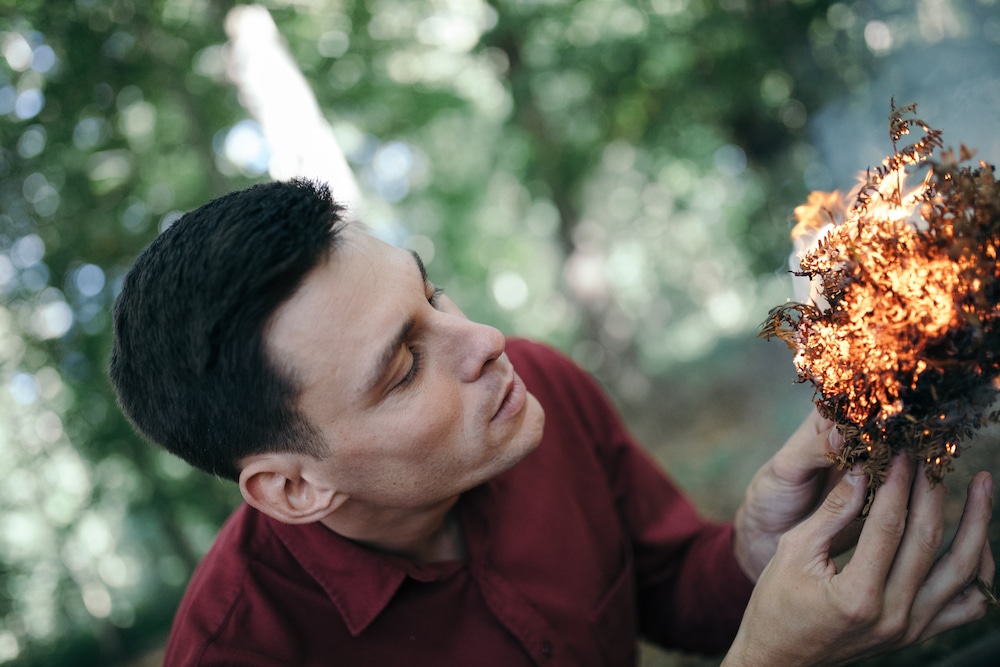
Daniel Hume – Photo by Nick Pope
You have travelled to amazing parts of the world, what is your favourite place and why?
New Guinea, without a doubt. I’ve only been three times but I’ve visited many parts of the great island and some of the satellite islands off the coast and I think it’s just the most exciting place. It is one of the few places that really stirs the soul, especially when you fly over the interior at low level. All you see is endless, uninterrupted rainforest – no roads, fences or power lines. And it only gets better when you’re on the ground and really getting stuck in, although it can be a very tough place to travel. That’s part of the draw though I think – it’s a challenge and there’s a sense of trepidation.
There are very few rules and regulations and I love that – it appeals to my nature. Once you get out of town, life is very traditional. I’ve even met people that grew up without metal and still know how to make stone tools – you see the old tools discarded around some of the villages and along the riverbanks.
I’m actually preparing for another trip there as we speak. Later this year, a friend and I will be heading into a really remote area in the lowland jungles of the central part of the island and I cannot
wait!
You’ve authored the book ‘The Art of Fire’ is that something you have always wanted to do? How did it come about?
I’ve been studying these fire making skills since I was very young and I’ve spent all of my adult life teaching them to others. They were hard won skills, to put it mildly!
It was only a couple of years ago though that I thought to myself, no one has really celebrated and recorded these skills properly all in one book, so I set out to do it.
There is a lot of inaccurate and irrelevant information surrounding this subject and that’s partly why success was slow for me when I was a child. Even in top museums I noticed information that was entirely untrue or incomplete and it baffled me; I looked at the inaccuracies of some information in disbelief.
For me it was like walking into St. Paul’s Cathedral and reading a sign saying ‘this building was designed by Leonardo Da Vinci’.
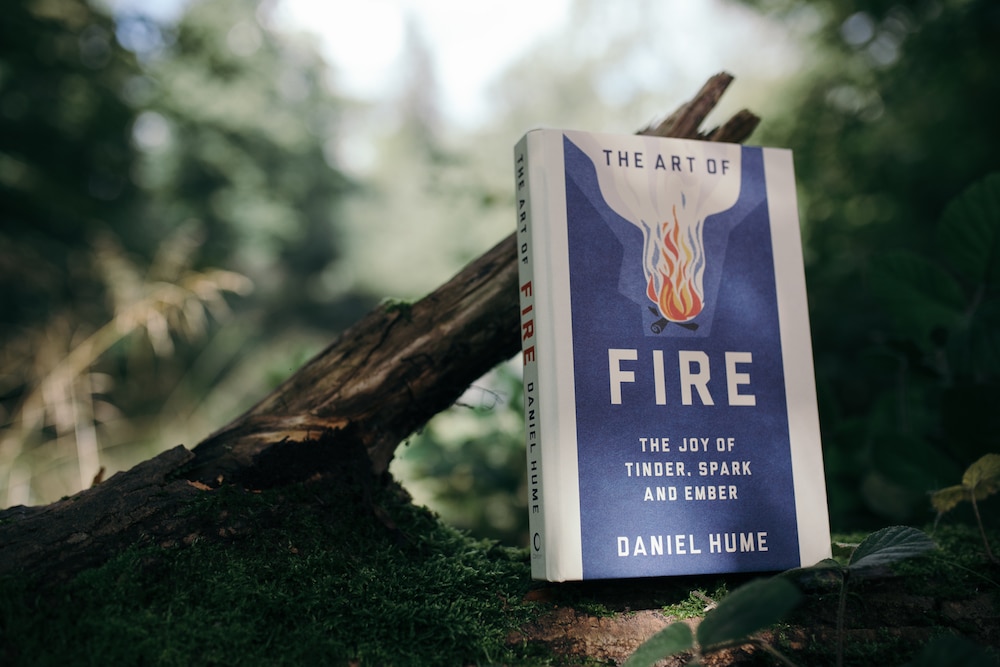
The Art of Fire by Daniel Hume – Photo by Nick Pope
Of course, there was and is some good information written already, particularly that which was written in the late nineteenth century, but when you’re young and have little experience it’s difficult to differentiate between the wheat and the chaff.
Even so, I still felt something was lacking and that the job hadn’t been done thoroughly enough. I felt there needed to be a book dedicated solely to the fire making skills and I felt that I had really put the years of time and effort in to mastering them and could do the job thoroughly and accurately. I wanted to describe how they work, to celebrate that knowledge and pay tribute to the people that developed them.
I took trips all over the world in order to meet the people that still use their traditional methods, to interview and photograph them. What we’ve created is unique: part instructional manual, part anthropological record, part celebratory work and I’m very proud of it. It’s my hope that it will help others to learn efficiently what I have struggled with for many years and provide an important historical document of these techniques before they are gone.
Fire is obviously your passion and that comes across strongly in the book, what’s your next biggest passion?
My biggest passion has always been the natural world as a whole; fire is just a part of that – albeit a very important one. I love simply being in the natural world and observing what goes on.
Although I make long, tough journeys in the wilderness from time to time, I much prefer to base myself somewhere remote and explore the local area. I can move very fast in the wild if I need to, but I don’t enjoy long, tough days of travel as much because you don’t see a great deal and the whole thing can become a logistical puzzle that takes opportunities away from you. Don’t get me wrong, I like to move on to a new place as long as it is an enjoyable pace.
Some of my biggest passions are flying, hunting, canoeing in remote Boreal forest, and just being with good company in the wilderness.
In your travels, you’ve obviously been to many far flung places where English isn’t spoken, there’s a fine example of this when you’re trying to find Mr Jamri, one of the last people to be able to make a fire piston by hand, what do you feel aids you the most in your communication across that language barrier, or is it less of a barrier than we think?
Yes, it is less of a barrier that you might first think, especially if you’re just on holiday. If you have specific questions though and require in-depth and accurate answers, it can be more so. I think the best thing is to get a phrase book and learn the most common and useful lines before you go, then try to build upon that while you’re in country. People love it if you have a go and that can spark up interactions which in turn teach you more.
Misunderstandings get people laughing! You might feel like a fool but people respect you when you try and will not laugh at you but rather laugh at the novelty of a foreigner speaking their language. That’s the key to breaking down any awkwardness and once you’ve done that, you feel confident and really start to learn.
Things can get tricky when you want to ask very specific things but most of the time you can mix gestures with basic words and get the point across. I’ve often been frustrated with myself though when I’ve wanted to know the exact answer from an elder of a tribe for example. You can see the person’s face alive with enthusiasm as he explains, his hands gesturing and his mind racing and recalling the old days and then the answer comes back from the translator as one simple sentence (that you knew already) and the rest is lost.
The questions you ask and how you ask them are of vital importance too. Questions that can be answered with ‘yes’ or ‘no’ are often not answered accurately or with any elaboration.
My advice is: wherever you’re going, learn as much of the language as you can, keep a smile on your face and throw yourself in at the deep end.
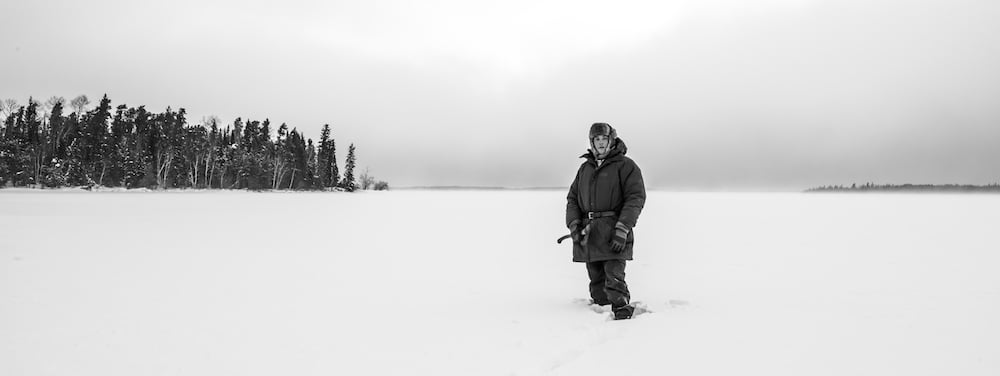
Winter travels – Photo: Daniel Hume
What’s the most important lesson that you’ve learned from your time in the wilderness?
To never assume anything and always expect the unexpected.
What’s your favourite time of year and why?
I enjoy every season because each brings its own joys. If I had to choose a particular time though I would say Christmas when all the family is together.
If you could spend a day with anyone (alive or dead) who would it be and why?
A Mesolithic hunter from Suffolk. I’d really love to go back 10,000 years and have a day hunting alongside someone who lived near where I live now. It would be great fun and we’d learn a lot from each other.
I’ve read a bit about your youth, leaving school young etc and your start with Woodlore at a very young age, would you do anything different now?
No, I don’t think I would.
What do you hope the future holds for you?
A happy and healthy family, more travel, more writing. I hope I can inspire others and have a positive impact on the world.
What’s your key advice on people trying to master fire lighting?
Read about it in a reliable source then practice loads. Experiment, be inquisitive and then really observe what happens.
Can you share an uplifting / positive experience with us?
I went to East New Britain, a province of Papua New Guinea, to photograph the Baining tribe fire dancing and the fire plough technique of making fire.
The young men of the tribe knew about the skill but it seemed they had never had to use it, unlike in neighbouring New Ireland where I was heading to afterwards. In fact on my trip to see the fire dance I caused quite a spectacle when I asked if someone could demonstrate the plough for me. The young men put so much effort into showing me but it just wasn’t working.
It wasn’t until an older man came along and showed us all. He had really lived the skill and made fire easily in only a few seconds and then the whole community went mad and began rubbing any old pieces of wood they could find around them, together in an effort to emulate what they had seen. Men, women, young and old were breathing life back into the old way.
We were flattered when one woman made my girlfriend a dress that day as a gesture of thanks. It seemed like my visit had prompted the passing on of their traditional skill before it was too late.
What “Golden Rule” do you live by?
Say yes to pretty much everything.
There’s a chapter in your book called ‘Fire Saw’ and at the end of your personal musings which come at the start of the chapter, you said “…The children laughed as they sawed. I hoped that my request would mean that this skill would be reignited in the village, if only for a short time.”
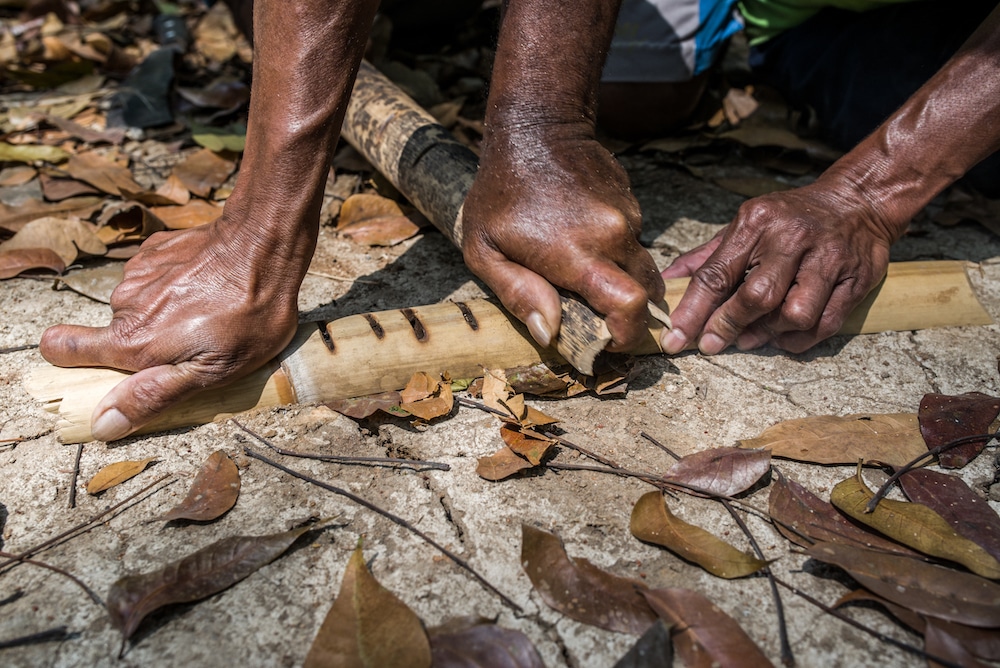
Fire Saw – Aeta tribe, Zambales Province, Luzon, Philippines – Photo: Daniel Hume
Do you feel that the modern world is decaying the knowledge of fire lighting and other indigenous skills to that point we are going to lose them? Do you feel pressure to make sure they don’t become lost arts?
Yes, the modern world is making some old skills irrelevant in their original context but I see that as a natural progression and definitely not something we should try to stop. So, no I don’t feel pressure to ensure these skills are continued to be used in their original context. That would be like a more technologically advanced alien coming down from another planet and coaxing us into navigating with a sextant.
I do think it is important to keep a record of these things though and slot them into the modern world wherever they retain their relevance and offer benefits. As the saying goes “If you keep one eye on the past, you are blind in one eye but if you forget the past, you are blind in both of your eyes.”
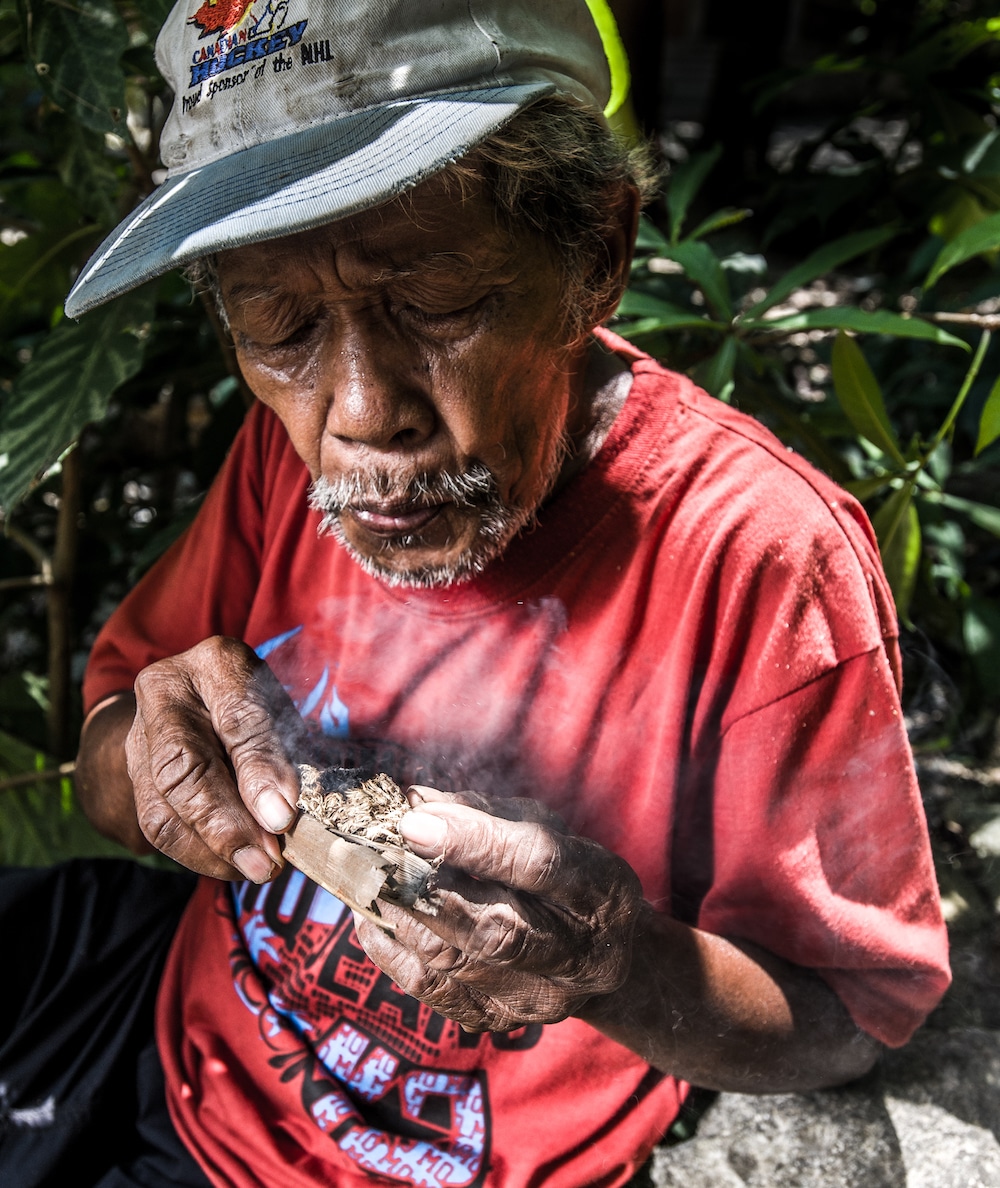
One of the last members Mangyan tribe who is highly skilled in the Fire Saw – Photo: Daniel Hume
Can you tell us your favourite joke?
Well, it’s hard to choose a favourite joke but my favourite comedian has to be the late, great Ken Dodd, one of the last – if not the last – great entertainers. I was fortunate enough to see him live many times. Famous for his one liners, he once quipped (referring to his tax evasion in the 1980’s):
“I thought it would be a good idea to go into Politics, maybe I am a little old… but you know… I’d love to be Chancellor of the Exchequer – That way I’ll be united with my money!”
What’s the hardest thing you’ve needed to do?
Unnecessary paperwork. What a waste of life.
What do you think would be an interesting question to be asked?
What’s your favourite song?
What’s the answer to the previous question?
‘Move on’ by Abba
What does a perfect day for you look like?
Any day I’m having fun with my family.
What’s your favourite way of relaxing?
Floating over a pristine coral reef wall with a mask and snorkel on. Not kicking at all, just floating, relaxing every muscle and letting the current take me along as I gaze at the brilliant colours and textures of the wall as they plummet into the depths of the sapphire coloured ocean.
What’s your most embarrassing moment and can you tell us about it?
It was a Wednesday morning, I was eight years old and was climbing up the stairs of the coach which would take us to the local swimming pool for a lesson, as it did every week. We arrived and my peers and I began undressing in the changing room and getting ready to go through to the side of the pool to begin the lesson.
I took my towel out of my bag and carefully hung it up on the hook ready for later. I then placed my bar of soap on the bench below it.
Then I reached into the bag to get my swimming trunks. As I removed my hand I found to my horror that it was actually my mum’s swimming costume and not my trunks. Mother dearest had packed my kit in such a hurry that she didn’t realise the mistake.
What did eight year old Dan do instead of going to the teacher to tell her I had the wrong kit? That’s right…….once all the other kids had gone out to the pool, I hastily pulled on the swimming costume even though it was about ten times too big for me.
After some considerable procrastination, I plucked up the courage and waddled out to the pool area in front of all my peers sitting patiently for me on the bench. Everyone burst out laughing as I struggled to keep the baggy costume from falling down. Then the teacher asked me to get in the water and that’s about the point my memory fades thank goodness!
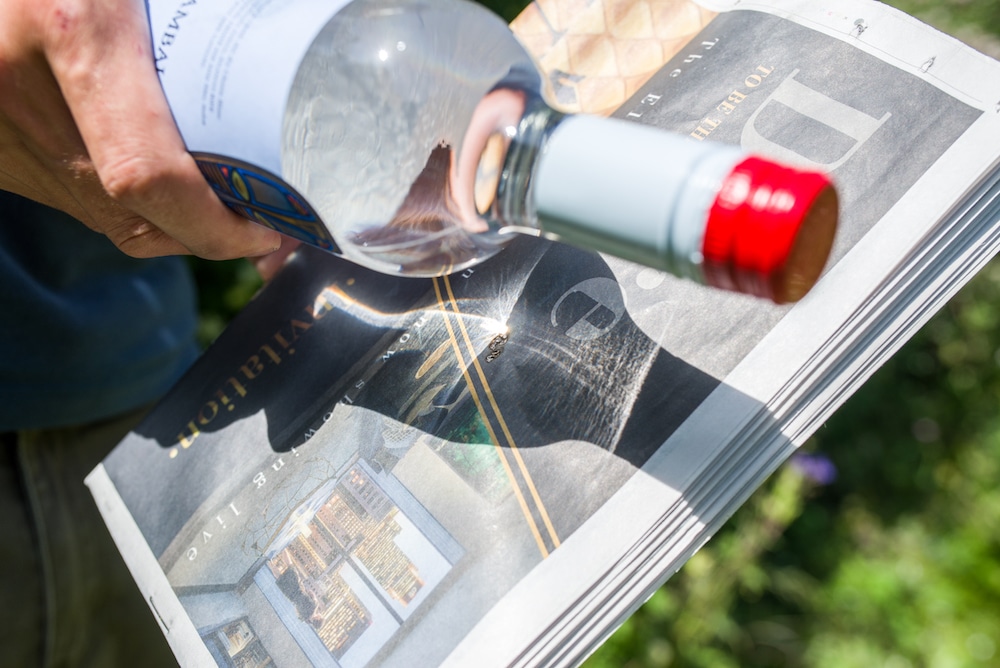
Improvising a lens with bottle of water – Photo: Daniel Hume
Near the end of your book you talk about your trip to Finland and your gratitude for having the skills to survive when you found yourself, in the dark, and unable to find the lean-to you and your friend Rob were hoping to use for the night. You point out that this could have had a very different outcome without your knowledge of fire.
Have you had any other experiences where your knowledge of fire or the other skills you know have saved the day?
I can’t really think of any other occasions similar to this one. It’s hard to know where the line is really because we all avoid danger every minute of every day due to our knowledge and skills.
We are all constantly taking preventative measures to avoid danger or inconvenience and are reacting to our environment when something presents itself. In the bush, things are the same. So the answer I guess is yes, there have been lots of occasions but they hardly register in my mind because I’ve made good decisions and reacted properly before they’ve become noteworthy.
For example, if I was making a trip in the north in extremely cold winter conditions, I could theoretically say “Yes, I avoided death by making sure I dried my gloves out thoroughly last night and had a good breakfast this morning.”
Who are your heroes and why?
Sir Winston Churchill
Vice-Admiral Horatio Nelson
Dr Jacob Bronowski
Sir David Attenborough
Sir Elton John
I greatly admire their achievements and have gained huge inspiration from them.
Are you going to continue travelling the world in pursuit of increasing your knowledge of fire and fire lighting techniques? If you are where are you thinking and what are you hoping to learn when you’re there?
I’ve got no travel plans that are solely in place to learn more about fire, but even so, I never switch off from any learning.
Why should people buy your book? And who is the book for?
Because it celebrates an element that has been crucial to our development as a species and I think we should all acknowledge it more. The book is designed for a wide audience – not just those interested in camping, outdoor skills and wilderness travel. This is a book that was designed to engage with others too. Archaeologists, anthropologists, historians, teachers and Joe Bloggs down the road.
I’ve split each chapter into two. The first part of each is an anecdote from my own experiences and the following part is a practical step-by-step guide. So, even if a reader has no desire to go out and get hands on, they will hopefully still enjoy the read and learn something really interesting. Finally, as I’ve already said, the book is based solely on my first hand experiences; everything I describe, I have gradually mastered over the last twenty years and know 100% that it works.
If you follow the advice in there and put the time into practising, you will succeed.
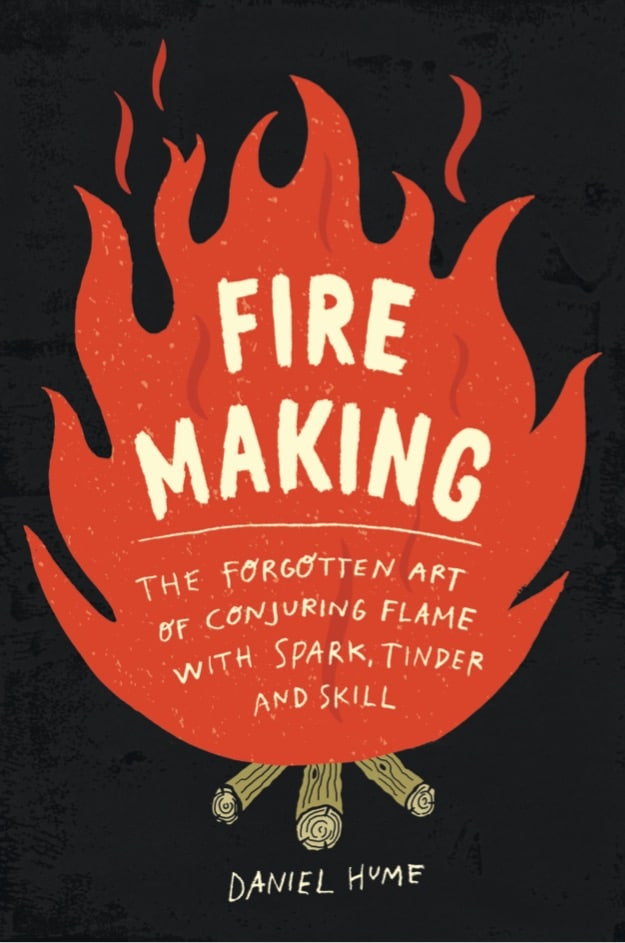
Photo: Daniel Hume
Thanks so much for taking the time to answer our questions Dan, it’s great getting to know you more and we’re looking forward to the next book!

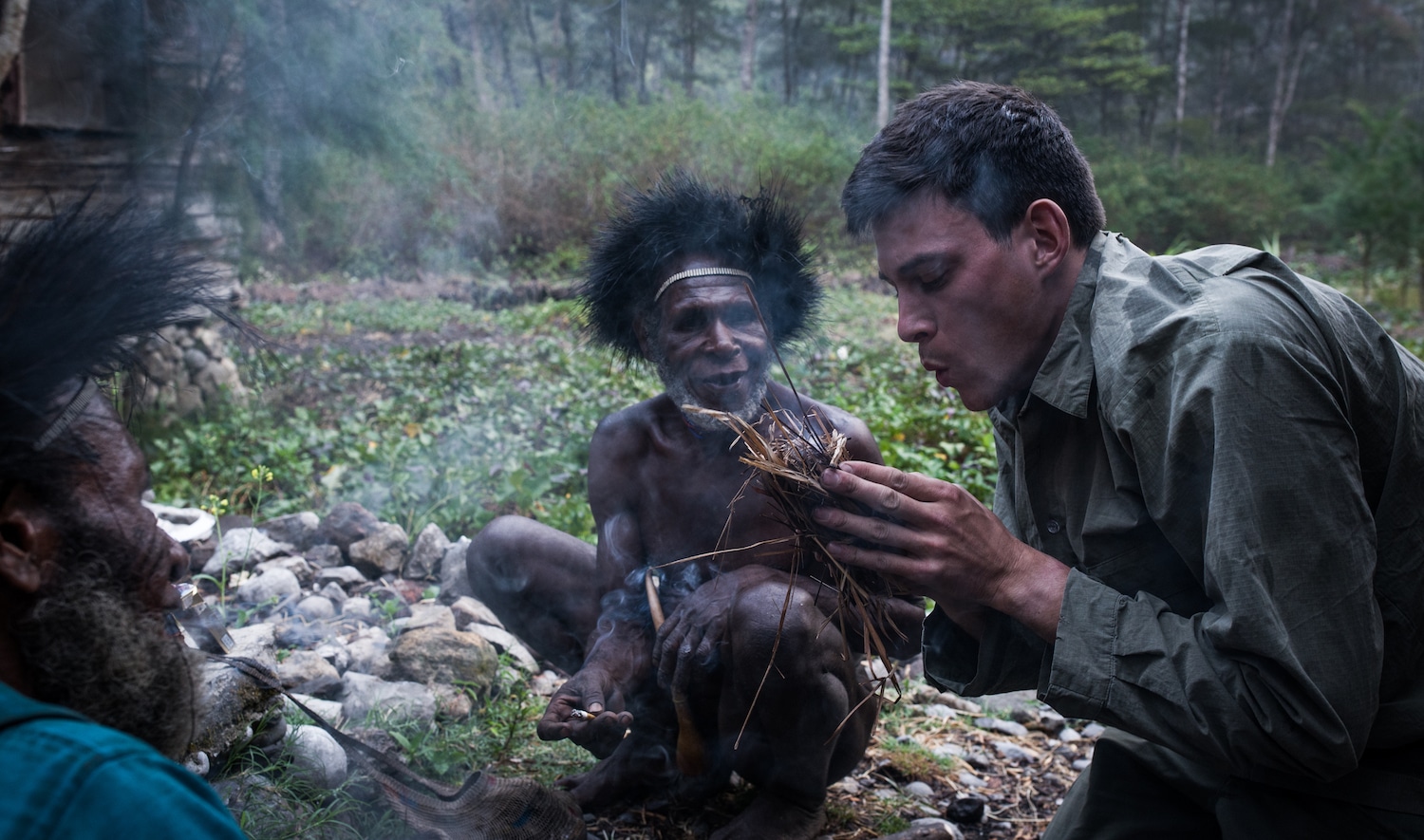

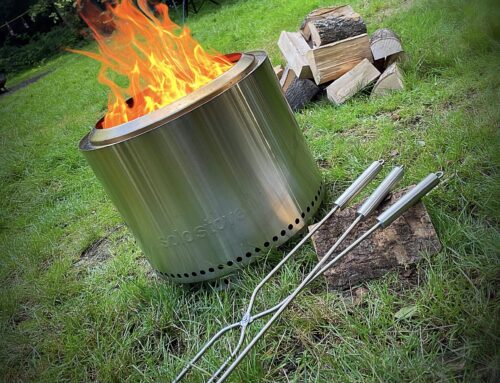
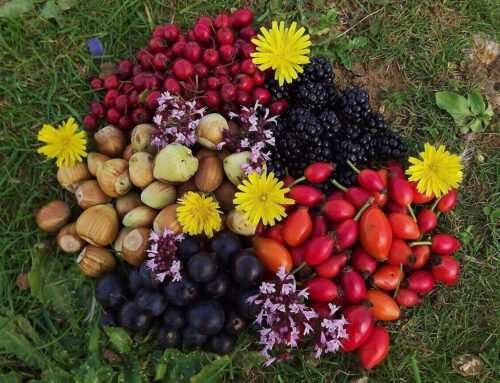
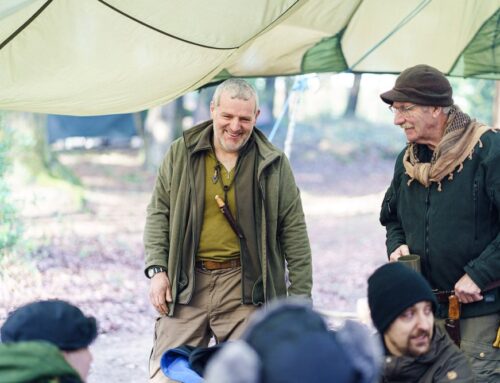
Leave A Comment
You must be logged in to post a comment.